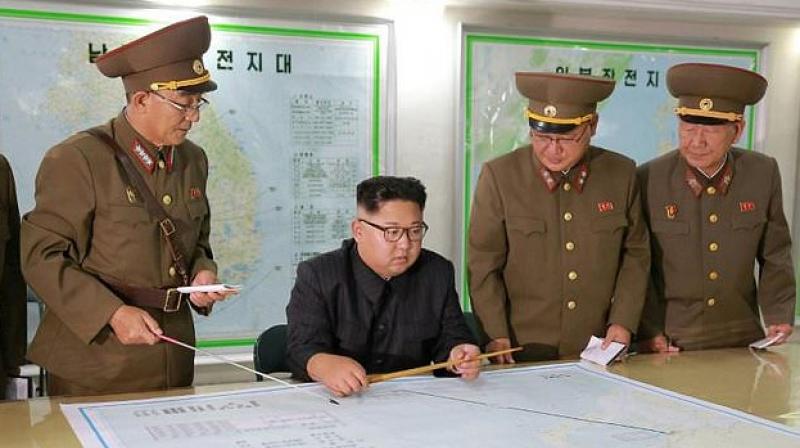After 6th nuke test, S Korea says N Korea could be preparing new missile launch
North Korea's Sunday's blast had a strength of 50 kilotons, defence ministry officials told a parliamentary briefing.

Seoul: North Korea could be preparing another missile launch, Seoul said Monday as it stepped up its defences following Pyongyang's biggest-ever nuclear test and declaration it had a hydrogen bomb.
The South and the United States will deploy more of the Terminal High-Altitude Area Defense (THAAD) missile launchers that have infuriated Beijing, the defence ministry said.
The announcement came after Seoul fired an early morning volley of ballistic missiles in an exercise simulating an attack on the North's nuclear test site.
Pictures showed South Korean short-range Hyunmoo ballistic missiles roaring into the sky in the pale light of dawn from a launch site on the country's east coast.
Pyongyang said the device it detonated Sunday was a hydrogen bomb -- far more powerful than the fission-based devices it is believed to have previously tested -- and small enough to fit into a missile.
The blast laid down a new gauntlet to President Donald Trump, after the North in July twice tested an intercontinental ballistic missile (ICBM) that appeared to bring much of the US mainland into range, and threatened to send a salvo of missiles towards the US territory of Guam.
In a briefing to parliament, South Korean defence ministry officials estimated its strength at 50 kilotons -- five times the size of the North's previous nuclear test, and more than three times bigger than the US device which obliterated Hiroshima in 1945.
But they did not confirm whether it was a hydrogen bomb, saying only that "a variety of nuclear material" had been used.
Signs that North Korea was "preparing for another ballistic missile launch have consistently been detected since Sunday's test", the ministry said.
It did not give details, or indicate when a launch might take place, but said that it could involve an ICBM being fired into the Pacific Ocean to raise pressure on Washington further.
- 'Appeasement' accusation -
After Sunday's test the United States warned it could launch a "massive military response" to threats from North Korea that would be "both effective and overwhelming".
"We are not looking to the total annihilation of a country, namely North Korea," Defense Secretary Jim Mattis said, but warned: "We have many options to do so."
Trump called an emergency meeting of his national security advisers and had his second telephone call of the weekend with Japanese Prime Minister Shinzo Abe.
But he did not talk to South Korea's Moon Jae-In for more than 24 hours -- instead accusing Seoul of "appeasement", raising jitters in Seoul about the two countries' decades-old alliance.
Moon, who advocates engagement as well as penalties to bring Pyongyang to the negotiating table, called for new United Nations sanctions to "completely isolate North Korea."
But Trump criticised the US treaty ally on Twitter, saying: "South Korea is finding, as I have told them, that their talk of appeasement with North Korea will not work, they only understand one thing!"
The nuclear test prompted an international chorus of condemnation, with UN Secretary General Antonio Guterres condemning it as "profoundly destabilising". The Security Council will hold an emergency meeting on Monday.
At their summit in China, the North's key ally, the five-nation BRICS grouping -- taking in the host nation as well as Brazil, Russia, India, and South Africa -- said Monday it "strongly deplores" the test.
Moon and Abe agreed to work for stronger sanctions against the North, but seven sets of UN measures have so far done nothing to deter Pyongyang.
US Treasury Secretary Steven Mnuchin said Sunday his department was preparing measures to "cut off North Korea economically" and ensure anyone trading with it could not do business with the US.
That would impact Beijing, which is responsible for about 90 percent of the North's commerce, but would also have dramatic consequences for the US as China is the world's second-largest economy.
- 'Perfect success' -
On Sunday US monitors measured a powerful 6.3-magnitude earthquake near the North's main testing site, felt in parts of China and Russia, with an aftershock possibly caused by a rock cave-in.
According to the South's Yonhap news agency, Seoul's National Intelligence Service said the test was the fifth the North had conducted in the same No 2 tunnel at the Punggye-ri test site, and it was "likely to have collapsed".
The North hailed the test as "a perfect success", with Pyongyang residents celebrating as a jubilant television newsreader hailed the "unprecedentedly large" blast.
Despite fears of a possible radioactive leak after the apparent collapse, Japanese and Chinese scientists said they had detected no radiation in the atmosphere.
Hours before the test, the North released images of leader Kim Jong-Un at the Nuclear Weapons Institute, inspecting a device it called a "thermonuclear weapon with super explosive power" entirely made "by our own efforts and technology".
The North says it needs nuclear weapons to defend itself against the threat of invasion, and analysts say it is seeking to build up its hand for any future negotiations with Washington.
But Trump has warned Pyongyang that it faces "fire and fury" and that US weapons are "locked and loaded."
"The Americans need to open a direct channel at a high level with the North Koreans," Delury told AFP. "That's the missing piece to all of this."

